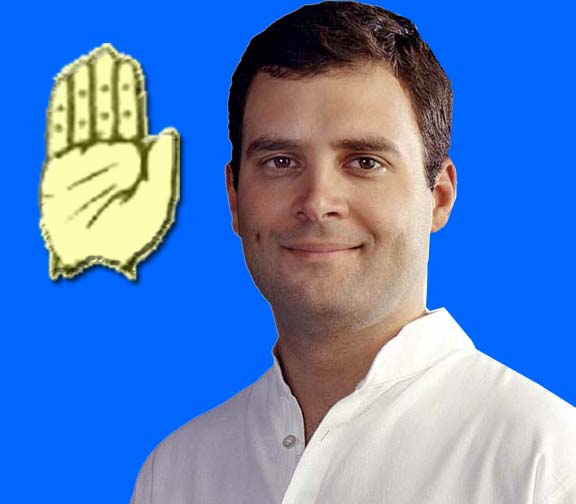‘India Shining for just a few is not our way’
 One moment he was on their TV screens, the next, in their homes.
One moment he was on their TV screens, the next, in their homes.
In what is becoming a Rahul Gandhi trademark, the Congress general secretary and son of late prime minister Rajiv and current party president Sonia Gandhi spent an unscheduled half hour at a sweepers’ slum in Panvel, much to the delight of the Dalit residents.
It started with a wave from Vikas Parke (20), an autorickshaw driver and resident of Valmiki Nagar.
“We were waving at the convoy when Rahul Gandhi’s vehicle stopped all of a sudden. He alighted, came up to me and shook my hand,” said the young man. “He asked me my name and where I lived.”
When Parke told him about the colony, Rahul (39), who had just finished addressing his first rally in the state nearby, asked to see it.
“I took him to my house. He asked about our problems and we told him about the waterlogging and lack of sanitation,” said Parke.
Rahul then asked for a glass of water, again, a trademark dismissal of caste barriers in a country where even urban households prefer that sweepers wait outside while the trash is delivered to them.
“I got him a glass of water, which he drank,” said Parke.
Children began to gather, asking for autographs.
“He shook hands with us and signed our notebooks,” said Puja Valmiki, a Class 8 student. “He told us we should study like him and become successful.”
Rahul spent half an hour in the slum, having tea with the sweepers.
“Most of us had been watching his rally on TV… we had never hoped to see him in the flesh, let alone in our homes,” said Karpe.
Earlier this year, Rahul had tea at the home of Dalit Vidarbha widow Kalavati Bandurkar. He has recently also been visiting village homes in Uttar Pradesh, on what is being called his ‘discovery of India’.
But if Rahul played nice guy after the rally, he was anything but nice while discussing the Opposition at the event organised to support local Congress candidate Prashant Thakur and Uran candidate Shyam Mhatre.
“In these elections there are two ideologies,” Rahul said at the rally, addressing a crowd of over 10,000. “One is that of the Congress with its ideology of progress of the common people, the backward and the poor. The other is of the opposition with its India Shining concept of a select few.”
The India Shining jibe was a reference to the BJP’s national ad campaign ahead of the 2004 election. With desperate, indebted farmers committing suicide every day and millions living below the poverty line, the India Shining tag enraged rural India and is believed to have contributed to the party’s loss in the national election.
“When we came to power in 2004, we had said that if India progresses, then each and every one will also progress,” Rahul continued. “In the last five years, the profits of that progress have been passed on to the common man through schemes like the National Rural Employment Guarantee Act (NREGA).”
Referring again to the NREGA, the world’s largest social security programme, Rahul accused the Opposition of calling the scheme a waste of funds when it was first proposed. “Helping the poor is ‘wasting funds’ for the Opposition,” he said.
Finally, Rahul called Thakur to the mike and said: “I have met Prashant earlier and have spoken to him. I am confident he will win.”
Then, in what is being construed as a sign that Thakur could get a ministerial berth in the state, Rahul added: “Prashant will work not just for you but for all of Maharashtra. He is young and energetic. Ensure his victory.”
A few hours after the Panvel rally, Rahul addressed another massive crowd in Pune — a rally that had more the feel of a rock concert than a political event.
To begin with, about eight thousand people waited nearly six hours in sweltering heat for Rahul’s six-minute speech.
The delay was caused by the fact that the local Congress workers had timed the rally for noon, though the school that was the venue had classes till 4 pm.
The crowd comprised mostly youngsters and women, with a smattering of foreign students from Pune’s many renowned institutes of higher learning.
“Congress ki vichardhara hamesha aam admi ke saath rahi hai (Congress has always been with common man),” Rahul began, sporting a white kurta-pyjama and his trademark spectacles.
“We had heard Indian political rallies were huge,” said Jennifer, a US citizen and political science student from Pune’s Ferguson College. “Now, I have actually seen a really huge rally.”
For Rahul, this was the fourth rally of the day—after Panvel, Aurangabad and Shahada in Nandurbar.
It was finally the end of Maharashtra, Day 1.